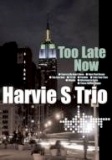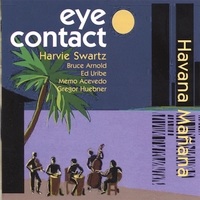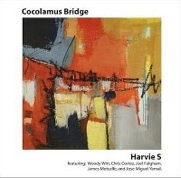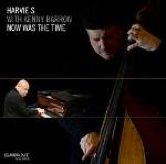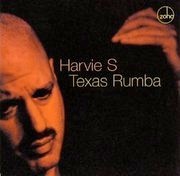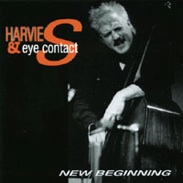Seattle Times
Sheila Jordan Harvie S 'Yesterdays' a treasure
New CDs released Tuesday, Jan. 31, include jazz singer Sheila Jordan's splendid live duets with bassist Harvie S, "Yesterdays."
Sheila Jordan Harvie S, 'Yesterdays' (High Note)
Years ago, the incomparable but perennially under recognized jazz vocalist Sheila Jordan made a duet album with bassist Arild Andersen, "Sheila," that is one of the treasures of my collection. High Note has now released a live recording from the early '90s of Jordan with bassist Harvie S that hits that mark again.
Jordan's high, light, mischievously supple voice and Harvie S's toffee-rich, dexterous bass achieve an orchestral completeness that never for a minute makes you feel anything is missing. Spontaneity and a sense of play are paramount. On "The Very Thought of You," Jordan improvises a recitative rebuttal, mid-song, of a review that complained she didn't sing the melody last time she was in town. But that's Jordan's thing: She inhabits the architecture of a tune, then celebrates it by messing with it. On "Honeysuckle Rose," after cracking up at a surprise bass "wow," she launches into a breakneck tempo that's just crazy.
On "Lazy Afternoon," Jordan slips into Meredith Monk-like Native American mode, then closes with a version of "I Could Have Danced All Night" that ends with a capricious soprano imitation of Julie Andrews.
When it's all over, she and everyone else in the room are giggling with joy. You will, too.
Paul de Barros, Seattle Times jazz critic
Featured Artist: Harvie S Trio
CD Title: Too Late Now
Year: 2011
Record Label: Ward Records
Style: Straight-Ahead / Classic
Musicians: Harvie S (bass), Bill Charlap (piano), Todd Strait (drums)
Review:
Approximately 23 years ago, Harvie S received a telephone call asking if he would be willing to play bass for a new, young musician performing at the JVC. Harvie has always been in demand both here and abroad, and he accepted the offer.
The festival went off without a hitch and over the following months, that young musician, pianist Bill Charlap, and Harvie S became friends. And as friends and musicians, they did what came naturally, played their instruments, jammed together and explored mutual, musical possibilities.
Charlap had introduced Todd Strait (drums) to Harvie and as luck would have it, Harvie had some studio time and suggested they go in and lay down some tracks. Discussions regarding what songs to play and a brief rehearsal ensued. Then history was made, although they didn’t realize it at the time.
Harvie S, put this trio together and produced this CD. Bill Charlap was only 20-years old, and Todd Strait was 26. The remarkable thing is this studio session was probably the very first recording ever made of Charlap who is now considered to be one of the best jazz pianists of his generation.
Too Late Now is almost an inappropriate title for this Harvie S Trio CD because it is never too late for truly exceptional jazz…and that is exactly what this is, exceptional from start to finish. It is however, the title song included in the nine tracks of the album.
Within the first ten notes of the beginning track, an unbelievably tight, up-tempo Franz Lehar tune, “Yours is My Heart Alone,” you understand immediately there is something going on beyond piano, bass and drums. There are no egos here, just a solid stream of honest interplay between three outstanding musicians. And what’s even more astounding is the trio sounds like they are seasoned veterans who have been playing together for years, yet their energy and simpatico is so fresh and new. Perhaps that’s the secret. In any event, this opener is phenomenal, the best of the CD.
Song placement is so important in the ebb and flow of an album, that’s why Van Heusen’s “Darn That Dream” is a beautiful choice for second position. Its dreamy gentleness allows the listener to catch their breath after the opening number. Other selections include Burton Lane’s “Too Late Now,” the extremely rare Oliver Nelson’s “111-44,” and Juan Tizol’s “Perdido.”
The sixth spot is one of Harvie’s own compositions, “Take Your Time.” Anyone that is familiar with Harvie S. can always count on his originals being A-1. This particular song, among my favorites of the album, is a sexy, little, swinging romp sans 50s style, that showcases the trio’s playfulness. Todd’s rhythmic patterns fit so perfectly, lending this song its hip attitude.
An outstanding arrangement of Wayne Shorter’s “Miyako” is stunning with Harvie offering a brilliant solo on bass and Charlap is fantastic throughout. John Lewis’ “Afternoon in Paris,” an infrequently performed number is esoteric at first blush, with tasty changes mid-way that has your foot tapping until the ending note. The final dish is the Jack Strachey/Harry Link song “These Foolish Things.” After listening to the full meal, this soft and familiar tune is the perfect dessert.
After finally releasing this 1988 recording session, one that Harvie thought might never get released, I asked Harvie what he thought about doing a present day follow-up to this CD with Charlap and Strait. His reply, “Wouldn’t Mind.” Certainly after listening to this brilliant piece of work, listeners might agree.
Harvie S Cocolamus Bridge (2010)
-
•
By RAUL D'GAMA ROSE,
The re-imagining of a traditional Irish ballad, "Eili Gheal Chiuin," does more than define the breathtaking skills of bassist Harvie S, as he takes wing on Cocolamus Bridge. It sets him apart as one of the very few virtuoso bassists of today. He has courage way beyond the narrow definition of the word, and has a fecund mind that is continually searching for new horizons towards which to stretch, taking with him a bass violin that sings with almost limitless possibilities. As unique as the solo bass choir of the Irish folk ballad is, it is just one facet of S' staggering talent: that of the unbridled soloist; making his bass sing with almost human facility is another.
Perhaps S gets that from his years in a duo role with legendary vocalist Sheila Jordan. It was, after all, Jordan who all but drove the bassist to play twin to her soaring bebop vocals. On "Cocolamus Bridge" the bassist provides a brilliant showcase of the voice-like sound of his instrument, which he explores in almost every tenor possible. He imagines lines that make great leaps across the soundscape, darting this way and that, zigzagging and flying in colorful whorls, and sometimes he underlines the harmony with a gravitas that recalls Charlie Haden's thunderously stuttering pizzicato. Like Haden, he makes the strongest showing in the very simplicity of his harmonic approach to the art of the song.
Harvie S can also undertake a complex course in the music. He plays a dramatic, contrapuntal role in "Courage," a decidedly abstract piece that seems to race along in the beginning almost as if it was mimicking a militaristic charge, while in "Coco Loco," he is puckish, prancing about the tune with child-like abandon. The triads that dapple his rendition of Wayne Shorter's "Night Dreamer"—not as close to the original as it might appear—especially in the solo, dart off from the beginning of a solo line that is brilliantly followed by dark notes in the low register of his bass, as he growls and grunts his way through the piece's edgy mood in tonal counterpoint to the shrill meandering of Woody Witt's soprano saxophone.
"To Bea" is a delightful and spritely dedication to Harvie S' mother, and features the bassist dancing around the piano line as he builds up towards a harmonically rich solo. This is followed by the guitar down low, as it is heard so often on the album. But the song has a Bossa Nova slant, and here, S shows his grasp of the swaggering rhythm, as does the percussionist on the date, James Metcalfe. "Ike (Take a Hike)" is inclined towards the Afro-Cuban danzon, but displays a similar shuffle as the song dedicated to the bassist's mother, before "Time and Beauty" returns the music back towards the abstract.
Following his beautifully crafted duet with pianist Kenny Barron, Now Was The Time (High Note, 2009), Cocolamus Bridgefurther cements the extraordinary career of Harvie S.
Track Listing: Eili Gheal Chiuin; Cocolamus Bridge; Courage; Coco Loco; Night Dreamer; To Bea; Ike (take a Hike); Truth and Beauty.
Personnel: Harvie S: bass; Chris Cortez: guitar; Woody Witt: tenor and soprano saxophones; José Miguel Yamal: piano: Joel Fulgham: drums; James Metcalfe: percussion.
Record Label: Blue Bamboo Music | Style: Beyond Jazz
CD Title: Now Was the Time
Record Label: High Note Records
Musicians: Harvie S (bass), Kenny Barron (piano)
Phenomenal musicianship and improvisation by two fantastic jazz veterans produced an outing so simpatico, so delightful in nature; you’d be hard pressed to find another venture as purely enjoyable. When Harvie S invited Kenny Barron to record with him in the studio in 1986 (from the bonus studio time Harvie was given from teaching some master classes at Suny Purchase), who would have imagined the magic that would happen there. Now Was the Time, just released on High Note Records, is the result thereof.In this 1986 outing, “there was no rehearsing, they just went in, played mostly standards and worked out the arrangements on the spot—no mixing, no fixing,” as was stated in the liner notes. They recorded the album “live on a 2-track early digital recording, (as analog was then the norm).” What is remarkable is that this diamond of a recording might have never seen the light of day. It was a year ago when Harvie S was sorting through some old cassettes and came across a tape labeled Harvie S and Kenny Barron. Listening to the tape, Harvie should-a-had a V-8, because he could not believe he ever tried to put out a recording of their session. As luck would have it, Harvie’s cassette find proved golden because the master tape was lost. His Betamax cassette would be transferred by Malcolm Addey’s Beta machine to today’s standards, and Now Was the Time was born.When you hear Harvie soloing the melodies on some of the best loved standards like “Body and Soul,” while Barron comps a supportive rhythm, it’s just all too good to be true. Filled with exciting energy and interplay, this is jazz at its very best. The give and take is all about the why-ness of jazz. No egos get in the way of its purity. The only problem is you want more and more, finding yourself replaying it over and over again to get your fill. Now Was the Time is the kind of CD you will talk about with jazz friends years from now, remembering the encounter of magnificence and the stunning simplicity of it all. It’s neither contrived nor staged...just honest jazz from a master duo. Straight-ahead, A+ and 5-stars all the way!
Tracks: Comfirmation, All or Nothing At All, Body And Soul, Take Your Time, Darn That Dream, Miyako, Isn't It Romantic?, Chelsea Bridge
Record Label Website: http://www.jazzdepot.com/
Artist's Website: http://www.harvies.com
Reviewed by: Suzi Price
CD/LP/Track Review | Published: May 3, 2006
Funky Cha
Harvie S | Zoho Music (2006)
Harvie S's inimitable, fearless and fun-filled approach to Latin jazz reaches a new pinnacle on Funky Cha. The bassist's musical sensibilities couldn't be summed up better than on the opening track, a re-visioning of Monk's "Rhythm-A-Ning. His bass and Daniel Kelly's piano pulse out Thelonian arhythmic fragments over Beaver Bausch's tappy drum groove, building in quirky intensity until we're jumping to find out where they're going with it. Jay Collins, the final piece of the puzzle, leaps in with the melody on tenor and reveals how nicely everything fits together.
This kind of hand-in-glove development has characterized Harvie's brand of jazz over the past several years, demonstrating why he's not only one of the best bassists in the land but also one heck of a small-group conceptualist. His Latin beats are definably Latin but consistently fresh; there are no generic mercado rhythms here.
Much of that, of course, is due to the company S keeps. Kelly slides smoothly between montuno and bebop; Bausch is a subtle drum master, and the added presence of Chembo and Ernie Colon pushes him ever higher; Collins is always tasteful and flexible. Only Kelly and tenor man Scott Robert Avidon, who guests on three tracks, are carryovers from S's last album, Texas Rumba, yet the full band sounds as if it has been together for years. This is a hallmark of musicianship, and one of many reasons why Funky Cha is impressive.
Harvie loves Monk as much as Latin sounds, and the influences meld well on tunes like "A Bright Moment, one of the more pensive tracks (until things really get rolling). He recorded the tune earlier for New Beginning but sharply reinvents it for this session. The perfectly named title track, Kelly's gorgeous interpretation of "What Is This Thing Called Love, and the tense modernity of "'S' reflect different facets of this taut ensemble's personality. They even succeed at the difficult fusion of jazz and the manic guaracha rhythm on Kelly's "Earquake. Outstanding, as expected.
Track listing: Rhythm-A-Ning; C7 Heaven; Mariposa en Mano; Earquake; S; Funky Cha; A Bright Moment; What Is This Thing Called Love; Coco Loco.
Personnel: Harvie S: acoustic bass; Daniel Kelly: piano; William Beaver Bausch: drums; Jay Collins: tenor and soprano saxophones, flute (1-3,5-7); Scott Robert Avidon: tenor saxophone (3,4,8); Philip Dizack: trumpet (3,8); Wilson Chembo Corniel: congas and Latin percussion (2,3,7,9); Ernie Colon: guiro, clave (3,7).
Harvie S
Texas Rumba
Zoho By Felix Contreras
Harvie S (formerly Swartz) is proof that you can reinvent yourself. Along with losing the rest of his last name he seems to have lost his substantial history as a straightahead jazz bassist as well. But Harvie S's turn toward a strictly Afro-Cuban musical path is not as out of step as it would seem. His work with an impressive list of jazz's A-list (Dexter Gordon, Sheila Jordan, Grover Washington Jr.) was the best training ground for his second act. The best Afro-Cuban jazz bassists, like Bobbie Rodriguez (Machito, Tito Puente) and Andy Gon-zalez (Ft. Apache, Eddie Palmieri), not only locked down the slightly-off-the-beat tumbao, they were also jazzers at heart who brought jazz sensibilities to their groove. The bassist's previous two discs marked his entry into Afro-Cuban music. Texas Rumba is a live workout of the core group he assembled to make those CDs: pianist Daniel Kelly, saxophonist Scott Robert Avidon, trumpeter Gregory Rivkin, drummer Adam Weber and conguero Renato Thoms. Like a handful of other groups, their music is played in clave but it is not slave to it. Percussionist Ray Barretto calls it "jazz-Latin," and that is an apt description of what Harvie S has achieved here. While they start the CD with a couple of clave-inspired numbers, the highlights are later. Kelly's solo piano on "Momentaneo" segues to a decidedly non-Latin bass piano duet, then to a very tipico mambo, moving on to Harvie S's solo take of "Monk's Mood." The exploration "Underneath It All" dominates the middle section, and a solo bass piece ends the CD and is exactly the breather needed to assess the situation: Did we just hear jazz or Latin music? But like the best Latin-jazz bands out there, Texas Rumba makes that question moot.
Harvie S & eye contact
New Beginning
Harvie S, acoustic bass; Bruce Arnold, guitar; Daniel Kelly, piano; Renato Thomas, percussion; Adam Weber, drums; Gregor Huebner, violin, Michael Brecker, tenor sax; Haru Takauchi, guitar; Ray Vega, trumpet.
Harvie S used to be Harvie Swartz, but got fed up with giving people black looks because they insisted on spelling it "Schwarz". Harvie offers us nine tracks on this CD, of which he has written eight. Afro-Cuban rhythms are strongly prominent; "En La Batalla" is a good example, some strong piano playing here from Daniel Kelly. These tracks will appeal to those who like interesting rhythmic variation and intelligent arrangements. "Luna Romantica" has a gentle, classical opening with a persuasive but quietly driving pulse; the stringed instruments give a good account of themselves, and for the first time a horn enters; guest Ray Vega on trumpet; a good slow number this. There are many different Jazz directions to be heard in this music; certainly the Latin rhythm is prominent throughout. A worthwhile CD; going out with some relish on the last track, "Mothership."
Harvie S
Havana Manaña (Bembe)
Led by veteran bass player and composer Harvie S, this first release from the band Eye Contact titled Havana Manaña brings us a fresh and clear look at making Latin jazz music. The six-man ensemble consists of Harvie S on bass and claves, Gregor Huebner on piano and violin, Bruce Arnold on guitar and processed guitar, Ed Uribe on drums and percussion, Memo Acevedo on congas, bongos, and miscellaneous percussion, and Barry Olsen on the trombone. The sound produced by the band is unique. Harvie calls it "jazz-Latin, music that's jazz cool and Latin hot." On the 11 selections Harvie and band display total control of the genre. Cubalypso is the opening gem, a basic chord progression with an Afro-Cuban beat, led and voiced by the processed guitar of Bruce Arnold sounding much like a steel drum. Bass Guajira is a slow paced guajira with the aid of bass, violin, guitar, and percussions only, creating a sensuous stream of music and rhythm. On Nuyorican Nights, written for trombonist/bandleader Chris Washburne, whose recorded version is done salsa style, Eye Contact plays it more like a bomba, with Huebner switching from the piano to the violin. And it continues like this throughout the entire production. Excellent.



